KRISAPP
SIA organized an App Challenge with variety of problem statements to select from. A wonderful opportunity for participants from all over the world to put their creativity into practical use.
I took part with three of my friends to design a solution for
“On-ground Experience: How might we offer an effortless and
customized ground experience for the passengers”
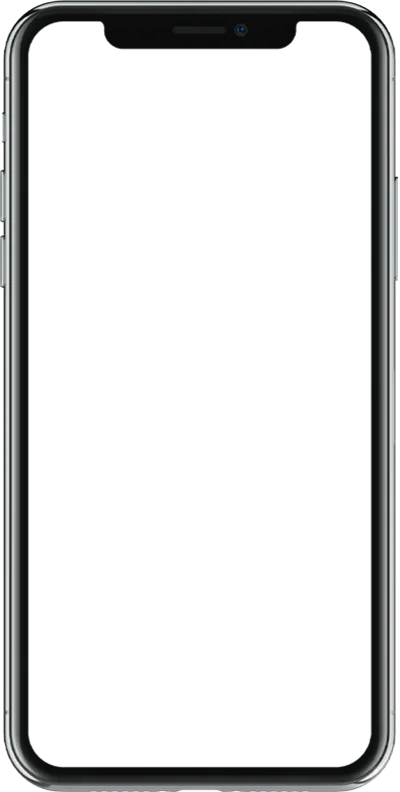
Prototype Design
A one-stop application that effectively covers all areas of the on-ground service experience – starting from the moment users decides to fly with SIA.
PROPOSAL DECK & PROTOTYPE IN 3 WEEKS
The goal was to bridge the gaps in the customer experience for travelers. We recalled the times where we travelled, there were many factors that builds up the experience from the point of purchasing a ticket to the point of flight departure.
Considering the short timeline, we needed to get the pain points down within the first week.
Teamwork is the Keyword
As a team, we worked on the research and came up with a design direction together. My main role was to combine all the UI screens and design the interactions from screen to screen, to the individual components.
ONE-STOP SOLUTION
Since Usability Tests are not required in this phase of the competition, our prototype was completed from a hi-fidelity wireframe. The features are showcased in the gallery below.
Digital Check-In and Boarding Pass Issuance
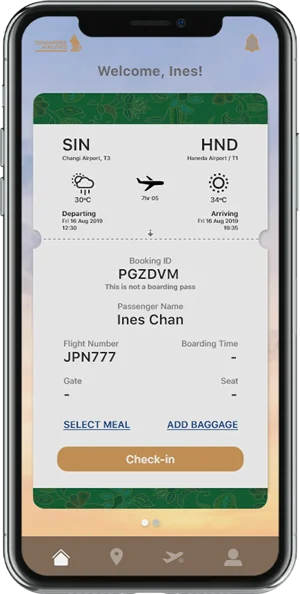
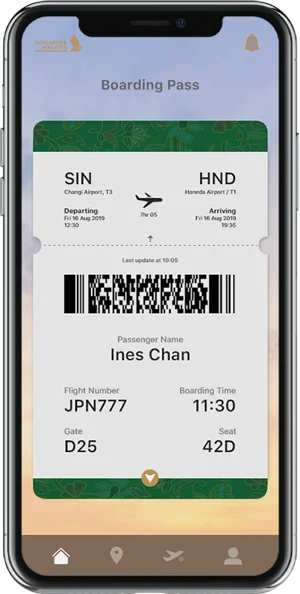
When passengers check-in through the app, boarding passes are generated automatically within. Pre-selection of inflight meals and additional check-in baggage will be available for purchase.
Live-updates of flight information will be prompted to users via the App
and the flight classes are differentiated by the following colours:
Gold
- First Class
Blue
- Business Class
Green
- Economy Class
Live Indoor Routing & Navigation
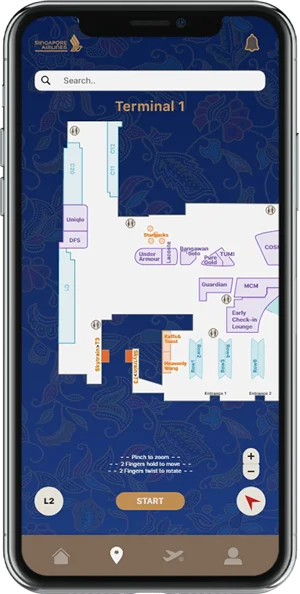
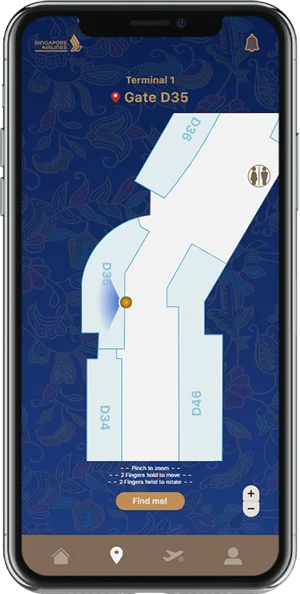
Provides an estimated travelling time from the user’s current location to their destination using Magnetic Field Technology.
This Live-Routing can help to reduce the risk of passengers missing flights due to bad estimation of required travel time and creates a better way-finding experience.
SilverKris Lounge Queue System
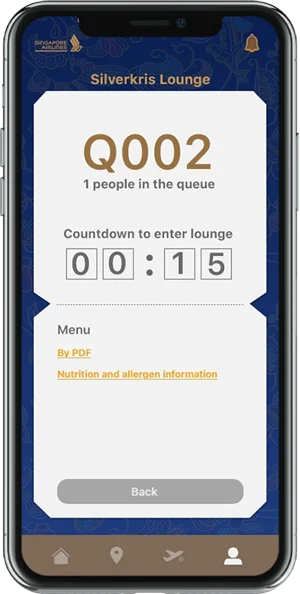
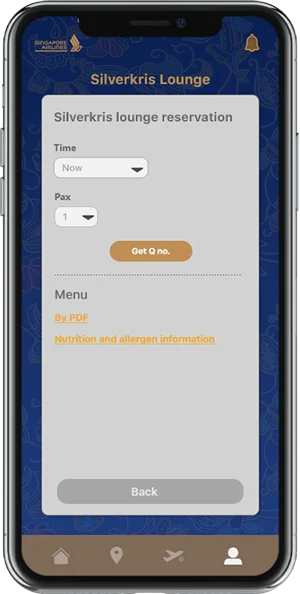
Users can make reservations for their lounge seats in advance or take a queue number for the earliest available seat.
This allows passengers to better utilize their time before flights and in between transfers instead of waiting outside the lounge for available seats. i.e. shopping
Personal Profile and Information
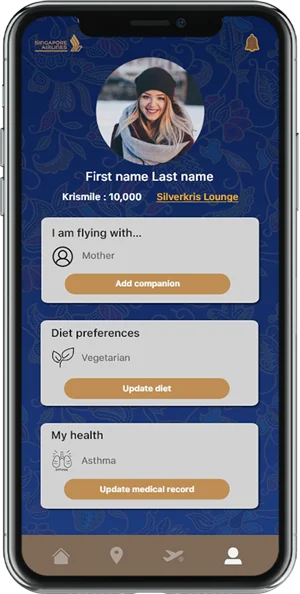
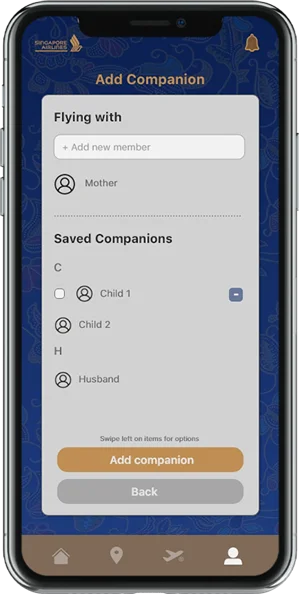
Users can add personal details like dietary preferences and health conditions here. These information will be synchronised with SIA's existing customer information servers which can be accessed by the air crew, thus increases their awareness of on-board passengers with particular conditions.
The companion List feature is for users to add elderly and children who are less tech savvy or do not have access to the App. Providing them with the convenience to request for special services such as i.e. Buggies/wheelchairs for less mobile flyers i.e. Bassinets for toddlers
The “Magic” Behind Indoor Live Navigation
By utilizing ‘Indoor Magnetic Field Technology’, live routing is possible for navigating within an indoor compound.
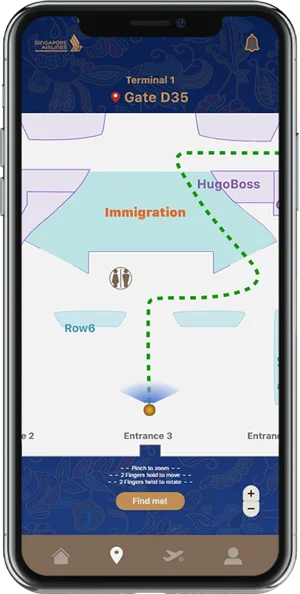
How it works?
No hardware installation is required.
Buildings have predictable magnetic fields caused by structural steel, wiring, machinery, ductwork, etc., and by recording the variations and filtering out magnetic noise, you can characterize an entire building.
Using the data to figure out where the device might be within that environment. Accuracy can be improved by using WiFi and Bluetooth data.
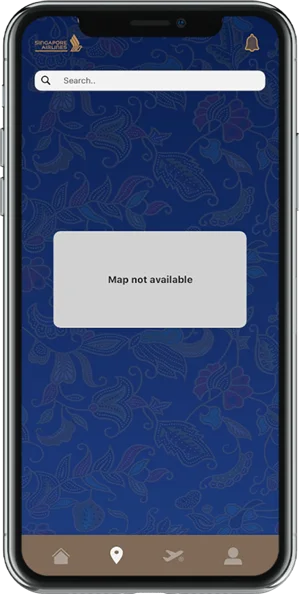
Privacy
Navigation will only be accessible to passengers who have a valid boarding pass.
Users will not be allowed to access the map once their boarding pass has expired.
OUR APPROACH
To further understand the “gaps” in the travel experience with SIA, we kicked off with interviews for some insights.
Interview
7 Interviewees
Ages 24 - 60
Key Observations
- SIA is associated with
safe, reliable and trustworthy.
- SIA’s on-ground services
do not seem any different from other traditional carriers.
-
7 out of 7
of interviewees
only recall their on-flight experience
with SIA.
-
Similar level of services
was provided
other traditional carriers at better prices.
Deeper Insights
Information from the interviews were not sufficient, so we expanded our method.
Google Survey
73 Surveyees
Ages 22 - 38
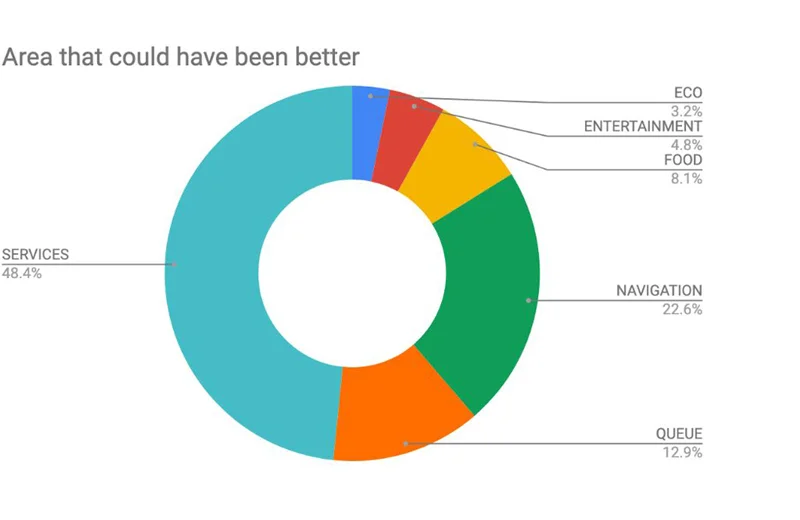
Key Observations
-
48.4%
of surveyees felt that services provided by SIA are comparable to other carriers.
-
22.6%
of surveyees feel that navigation to the boarding gates could be better.
- Majority of the surveyees stated that
airport navigation and service
are factors they take into great consideration when deciding with airline to fly with.

Quotes from some of our surveyees
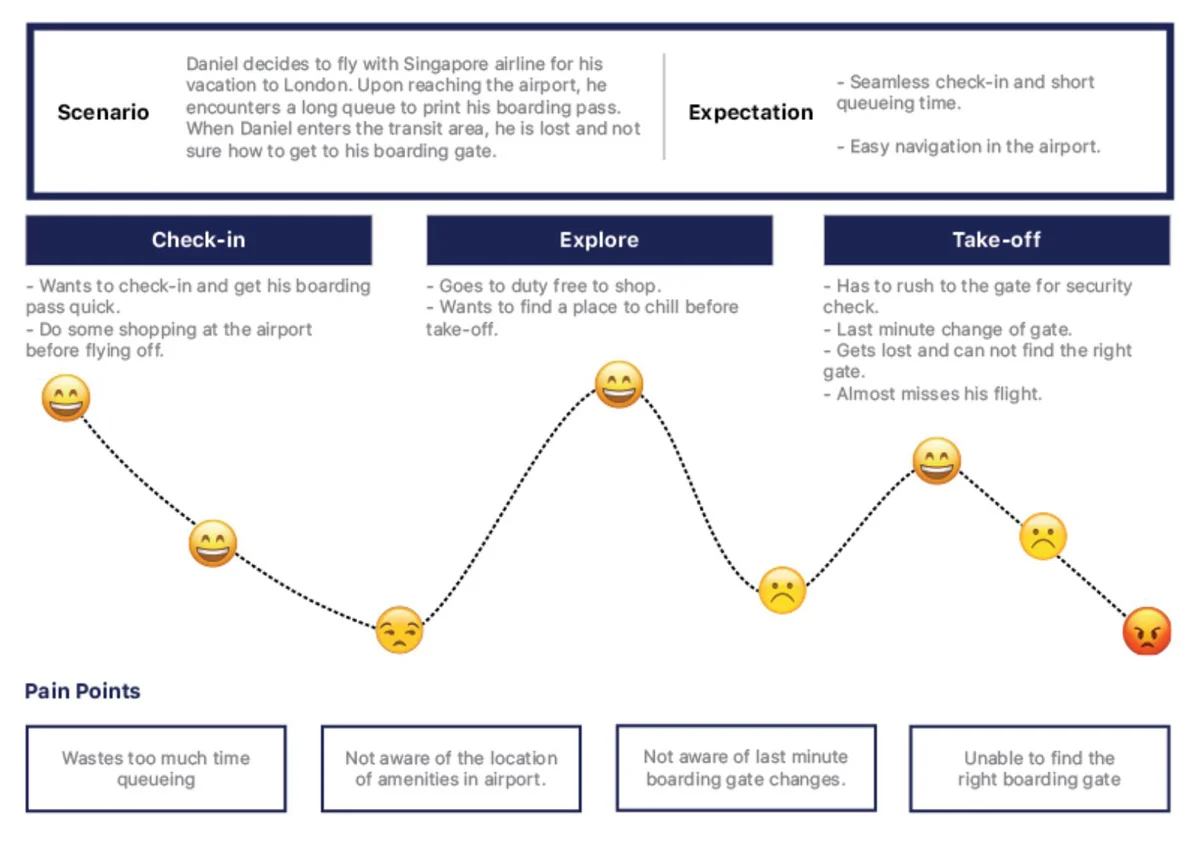
Projected Customer Journey Map based on our findings
BUILDING THE FRAMEWORK
After projecting the user journey, we are able to better conceptualise the contents and functionality in the interface. Using design studio helped us to stay aligned and produced a feasible design direction.
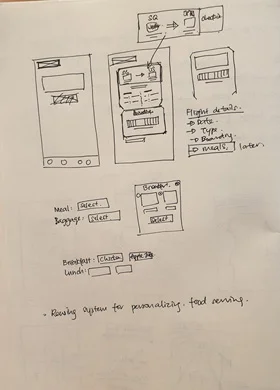
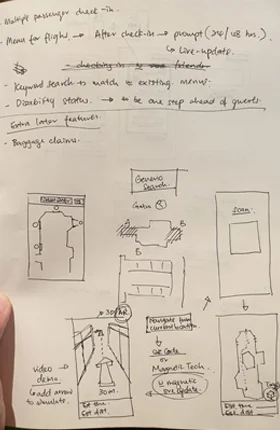
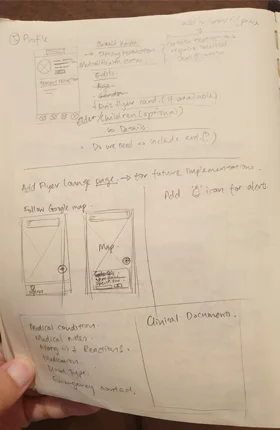
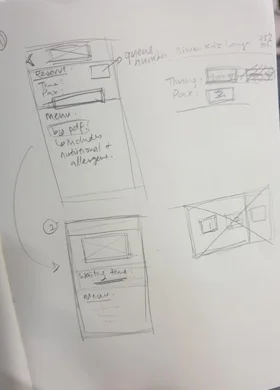
Sketches with some functionality details
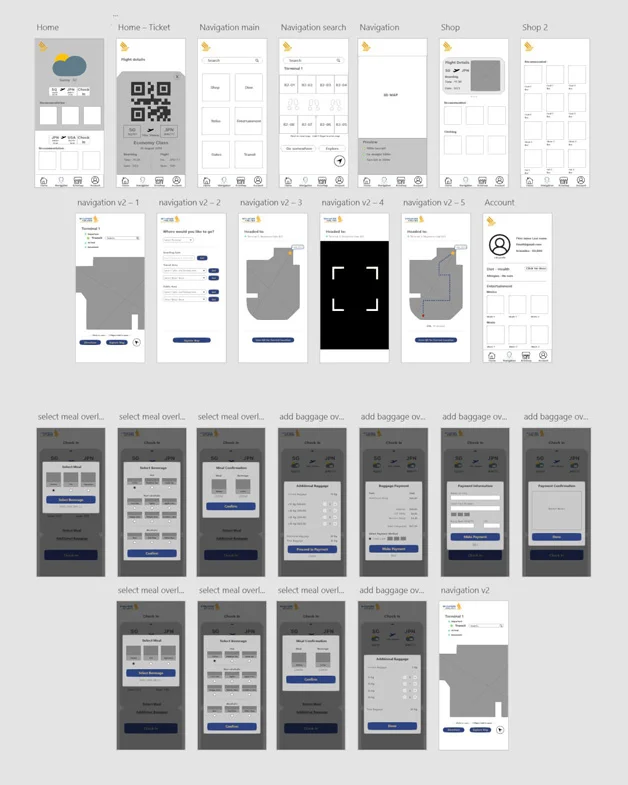
Initial wireframes to translate our sketches
Interactions and Flows
We found Adobe Xd as a good tool to communicate the App’s interactions and transitions due to it’s Auto-animate feature and user-friendly interface. With the user flows done as well, I could link the screens more efficiently while adjusting visuals to the final wireframes, maintaining the consistency of the prototype.
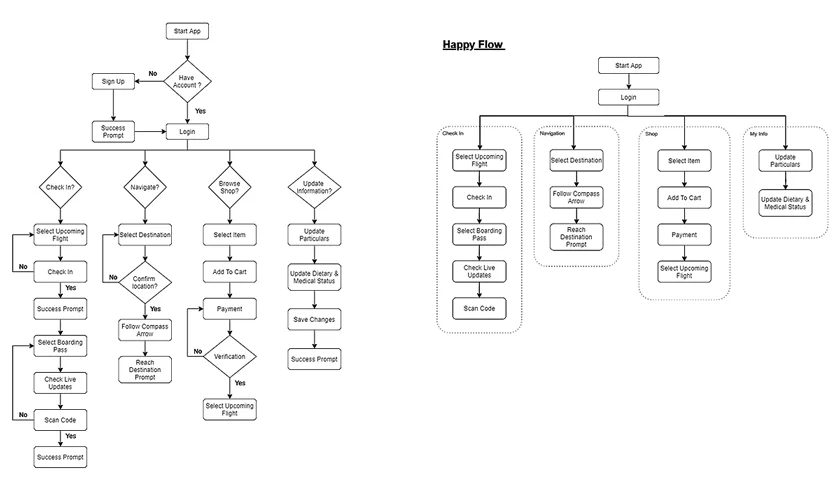
User flows: break-down version and the happy flow version
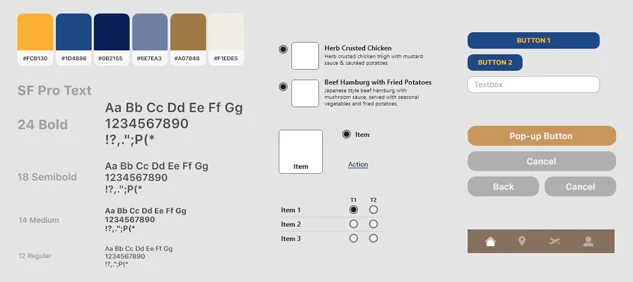
Style Guide

Wireframes after adjustments and visuals added
Our design was intended to provide a stress-free experience
while keeping the original colour schemes of SIA’s branding to
maintain its recognizability for customers.

Projected customer journey after using KrisApp
IT'S NOT JUST AN APP
To the Passengers, data and digitization are utilized to personalize their experience.
To SIA, manpower and resource deployment will be more efficient and productive. Crew members can be more prepared with the help of passenger’s personal data provided, allowing passengers to feel equally valued. Our solution also builds passenger’s emotional connections with the branding through personalized experience.
To the Business,
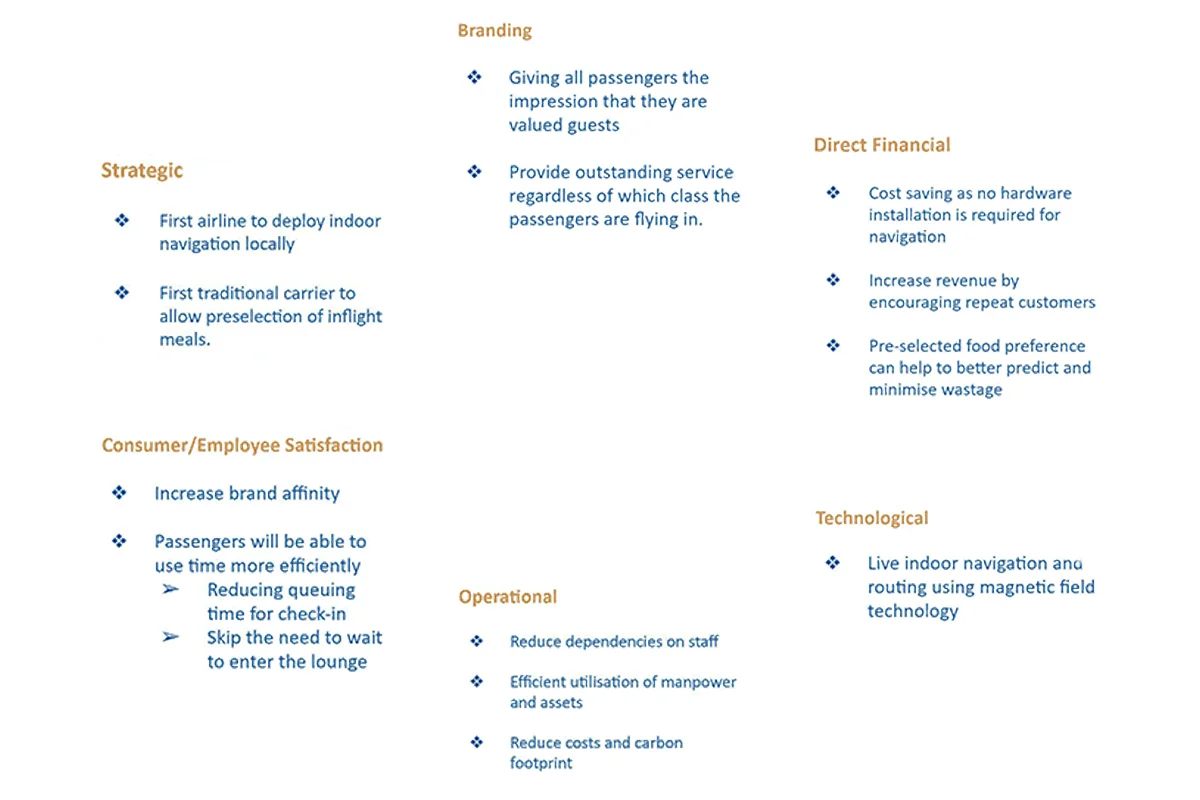
PROJECTING OUR PLANS
In hopes of being selected into the second phase of the competition, this platform was a great way to challenge myself in every aspect, creativity, skills, knowledge or even communication. Ultimately, compromising and supporting each other within a team is what allowed us to complete this project.
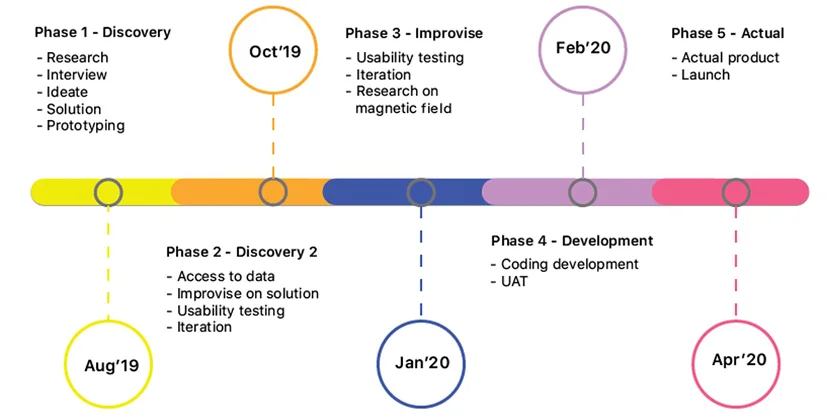
A projected plan and next steps
